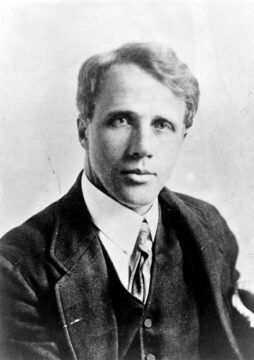Jessica Laser in The Paris Review:
 Though he is most often associated with New England, Robert Frost (1874–1963) was born in San Francisco. He dropped out of both Dartmouth and Harvard, taught school like his mother did before him, and became a farmer, the sleeping-in kind, since he wrote at night. He didn’t publish a book of poems until he was thirty-nine, but went on to win four Pulitzers. By the end of his life, he could fill a stadium for a reading. Frost is still well known, occasionally even beloved, but is significantly more known than he is read. When he is included in a university poetry course, it is often as an example of the conservative poetics from which his more provocative, difficult modernist contemporaries (T. S. Eliot, Ezra Pound) sought to depart. A few years ago, I set out to write a dissertation on Frost, hoping that sustained focus on his work might allow me to discover a critical language for talking about accessible poems, the kind anybody could read. My research kept turning up interpretations of Frost’s poems that were smart, even beautiful, but were missing something. It was not until I found the journalist Adam Plunkett’s work that I was able to see what that was. “We misunderstand him,” Plunkett wrote of Frost in a 2014 piece for The New Republic, “when, in studying him, we disregard our unstudied reactions.”
Though he is most often associated with New England, Robert Frost (1874–1963) was born in San Francisco. He dropped out of both Dartmouth and Harvard, taught school like his mother did before him, and became a farmer, the sleeping-in kind, since he wrote at night. He didn’t publish a book of poems until he was thirty-nine, but went on to win four Pulitzers. By the end of his life, he could fill a stadium for a reading. Frost is still well known, occasionally even beloved, but is significantly more known than he is read. When he is included in a university poetry course, it is often as an example of the conservative poetics from which his more provocative, difficult modernist contemporaries (T. S. Eliot, Ezra Pound) sought to depart. A few years ago, I set out to write a dissertation on Frost, hoping that sustained focus on his work might allow me to discover a critical language for talking about accessible poems, the kind anybody could read. My research kept turning up interpretations of Frost’s poems that were smart, even beautiful, but were missing something. It was not until I found the journalist Adam Plunkett’s work that I was able to see what that was. “We misunderstand him,” Plunkett wrote of Frost in a 2014 piece for The New Republic, “when, in studying him, we disregard our unstudied reactions.”
More here.
Enjoying the content on 3QD? Help keep us going by donating now.
